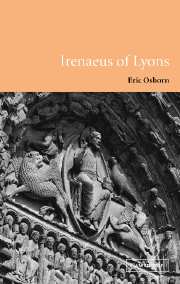Book contents
- Frontmatter
- Contents
- Preface
- List of abbreviations
- Chapter 1 Irenaeus: argument and imagery
- Part I DIVINE INTELLECT
- Part II ECONOMY
- Part III RECAPITULATION
- Part IV PARTICIPATION
- Part V CONCLUSION
- Appendix: Gnosticism
- Select bibliography
- Citations from Irenaeus
- Citations from the bible
- Index of classical authors
- Index of patristic authors
- General index
Chapter 1 - Irenaeus: argument and imagery
Published online by Cambridge University Press: 22 September 2009
- Frontmatter
- Contents
- Preface
- List of abbreviations
- Chapter 1 Irenaeus: argument and imagery
- Part I DIVINE INTELLECT
- Part II ECONOMY
- Part III RECAPITULATION
- Part IV PARTICIPATION
- Part V CONCLUSION
- Appendix: Gnosticism
- Select bibliography
- Citations from Irenaeus
- Citations from the bible
- Index of classical authors
- Index of patristic authors
- General index
Summary
LIFE AND WORK
The original Greek text of Irenaeus' Against heresies is found only in fragmentary form, while a complete Latin translation prepared about the year 380 has survived. There are three early manuscripts of the Latin translation, the oldest of which (Claromontanus) dates from the tenth or eleventh century. The others are later (Leydensis, Arundelianus). Erasmus' editio princeps of Irenaeus (1526) contains some readings not represented by any of these three manuscripts and the sources from which his variants may derive have since disappeared. Useful editions of Against heresies have subsequently been prepared by Massuet, Stieren and Harvey. The recent edition by Rousseau, Doutreleau and others (Sources Chrétiennes) supersedes earlier editions.
Eusebius mentions another work by Irenaeus, The demonstration of the apostolic preaching, known since 1907 in a sixth-century Armenian version. Lost works include the Letter to Florinus (also known as Concerning the sole rule of God, or that God is not the author of evil), On the Ogdoad, an attack on the Valentinian Ogdoad, which presents primitive apostolic tradition, On schism, addressed to Blastus and On knowledge, a refutation of paganism. Irenaeus intended (but did not produce) a work against Marcion (3.12.12). His writings all date from the last two decades of the second century.
Most early theologians were travellers, but their movements and teachers are not always certain.
- Type
- Chapter
- Information
- Irenaeus of Lyons , pp. 1 - 24Publisher: Cambridge University PressPrint publication year: 2001

